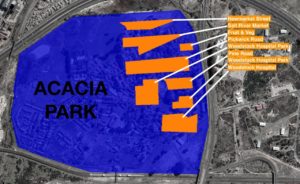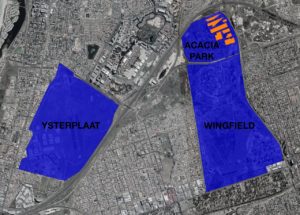Note to Editors: Please see attached the DA’s research on housing in Cape Town.
- Please see below maps of Acacia Park and the surrounding national government-owned land:


Ahead of Minister Patricia de Lille’s visit to city-owned sites this morning, I am releasing the results of detailed research and modelling work the DA has undertaken to address the housing shortage in Cape Town. The results can be accessed here, and the maps above indicate (in blue) the mega properties the DA wants to unlock, while the tiny plots (in orange) indicate the land De Lille is exclusively focused on while ignoring the mega properties.)
The most significant finding of this analysis is that, if released for housing, the land controlled by Minister de Lille and her ANC colleagues in the national government is 72 times bigger than all of the identified city-owned sites combined, and would provide between 13 times and 70 times as many homes for Capetonians (depending on densities used) as all of the city-owned sites combined.
My commitment is firm: We will release more well-located city-owned land, and faster, to deliver more affordable accommodation for Capetonians.
But, as this analysis shows, the real potential game-changer for affordable housing in Cape Town is the land controlled by Minister de Lille.
De Lille has failed to release this land despite her undertaking in 2019 that “We must make the land available. I believe this was and is the right thing to do. I think, now that I am the minister, this might be easier to achieve than when I was the mayor.”
Unfortunately, she has broken this promise she made to the people of Cape Town.
The DA’s analysis showing how badly De Lille has failed Capetonians is based on the mega-properties of Acacia Park and the Ysterplaat, Wingfield and Youngsfield military bases, which are all owned by the national government.
Our analysis further examined the potential housing yield of eight smaller sites owned by the city, including Pickwick Road, the Salt River Market and Woodstock Hospital. Our analysis shows that, in total, these eight city-owned sites only add up to 10-hectares, which would yield a maximum of 3 384 housing units using the high-density rate of 323 units per hectare.
In comparison, Acacia Park and the three military bases that De Lille refuses to release add up to over 725-hectares of usable land (excluding areas unsuitable for development such as power lines and wetlands). This land, which is under control of De Lille and her ANC colleagues in the national government, is 72 times bigger than the 10-hectares of all city-owned sites combined.
Even more striking is that this land, if released for housing and depending on the density of the new developments (between 60 and 323 units per hectare), could provide between 43 524 and 234 303 new homes for the people of Cape Town. This is between 13 times and 70 times more than all city-owned land combined.
On its own, Acacia Park, which is currently used to house a handful of politicians while Capetonians suffer homelessness, is five times bigger than all of the city-owned sites combined. Releasing Acacia Park for the people rather than politicians can provide between 3 408 and 18 346 new homes for Capetonians.
The implications of this analysis for the people of Cape Town are enormous.
The average household size in Cape Town is currently 3.2 people, which means that De Lille’s refusal to release Acacia Park and military-owned land has caused between 139 000 and 750 000 Capetonians to lose out on the opportunity to rent or own their own homes.
With almost 600 000 people on the housing waiting list, it is thus no exaggeration to say that we can massively reduce Cape Town’s housing shortage if De Lille stopped putting the interests of politicians and the ANC government she serves over the needs of the people by releasing Acacia Park, Ysterplaat, Wingfield and Youngsfield to DA-led Cape Town for development.
While I am committed to the release of the 10-hectares of land owned by the City of Cape Town for housing development, the truth is that these small bits of land on their own will hardly make a dent on the housing shortage in our city. In contrast, the release of the gigantic 725-hectares of Acacia Park and the military bases under control of De Lille and her ANC colleagues has the power to massively and sustainably reduce Cape Town’s housing shortage.
As the Minister of Public Works in the ANC government, De Lille surely knows all of this. Her refusal to release these mega properties for housing thus raises the question of whether she is deliberately trapping Capetonians in homelessness and a housing shortage for purely political purposes.
That would be a disgrace, and it is for this reason that the DA is committed to using every tool at our disposal to force De Lille to release these mega properties for the benefit of the people, rather than using the land to house politicians and to promote their narrow self-interests.




